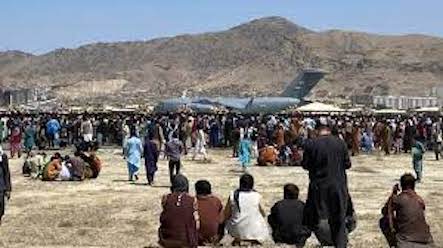As Afghanistan fell to the Taliban, disturbing footage surfaced of chaos at Kabul’s airport. Videos showed men climbing a crowded jet bridge to force their way onto a flight, men clinging desperately to the side of a moving US Air Force jet, and crowds sprinting on the tarmac as gunfire rang out.
One observation kept coming up in social-media reactions to the footage: Where were all the women?
In interviews with Insider this week, experts pointed to a combination of factors — most had to do with a distrust of the Taliban’s promise to be forgiving and more moderate.
“Afghan men are most likely to have worked with foreign organizations as translators, drivers, security guards, and in other roles dominated by men. Many of them justifiably fear reprisal from the Taliban, who have long condemned such people as traitors,” Robert Crews, a Stanford history professor who has written extensively about Afghanistan, told Insider.
As Afghanistan fell to the Taliban, disturbing footage surfaced of chaos at Kabul’s airport. Videos showed men climbing a crowded jet bridge to force their way onto a flight, men clinging desperately to the side of a moving US Air Force jet, and crowds sprinting on the tarmac as gunfire rang out.
One observation kept coming up in social-media reactions to the footage: Where were all the women?
In interviews with Insider this week, experts pointed to a combination of factors — most had to do with a distrust of the Taliban’s promise to be forgiving and more moderate.
“Afghan men are most likely to have worked with foreign organizations as translators, drivers, security guards, and in other roles dominated by men. Many of them justifiably fear reprisal from the Taliban, who have long condemned such people as traitors,” Robert Crews, a Stanford history professor who has written extensively about Afghanistan, told Insider.
“Another factor appears to be that many women are simply staying home because they do not want to be vulnerable to abuse at the hands of the Taliban.”
The Taliban has tried to address both of these fears in recent days, saying they would grant full amnesty to anyone who worked with the US or the former Afghan government and would allow women to work in the government.
But many fear that the Taliban are making empty promises and will return to the stringent interpretation of Shariah, or Islamic law, that it enforced the last time it was in power in the 1990s as soon as the US withdrawal from Afghanistan is complete.
Already there have been reports of Taliban fighters shooting at protesters, searching people’s phones for English-language messages, and hunting down and threatening city employees for not showing up to work.
“No one trusts that the Taliban will not carry out retribution against anyone who worked for the Afghan government or foreigners,” one person who is helping evacuations out of Afghanistan told Insider. They asked to remain anonymous because of the nature of their work, but their identity is known to Insider.
“There are tens of thousands of people at risk,” this person said. “They are so desperate to get out that they will cling to the outside of a plane.”
The source added that the male-dominated scenes at the airport were also due to false reports that people were being allowed on flights bound for the US and Canada.
Most of the people who arrived at Kabul’s airport “were young economic refugees hoping to get out and find a way to support their families back home with remittances,” they said.
That thought was echoed by Thomas Barfield, a Boston University professor and anthropologist whose work has focused on Afghanistan. Barfield told Insider that “even in ordinary times men make up the vast majority of people one sees in public places” in Afghanistan because of a culture where men are protective of women.
Shanthie Mariet D’Souza, the founding president of the Kautilya School of Public Policy in Hyderabad, India, and a nonresident scholar at the Middle East Institute who spent more than a decade working in Afghanistan, said that she had been in contact with women in Afghanistan recently and that some had decided to stay to fight for the rights they’ve so recently won.
“Women I have talked to have decided to stay back and fight it out,” D’Souza said. “For me it’s scary, but for them it’s something they need to do.”
“If there’s one positive development” of the US occupation, D’Souza said, it’s how it “helped women to stand up and fight for their rights.”
The Business Insider






























